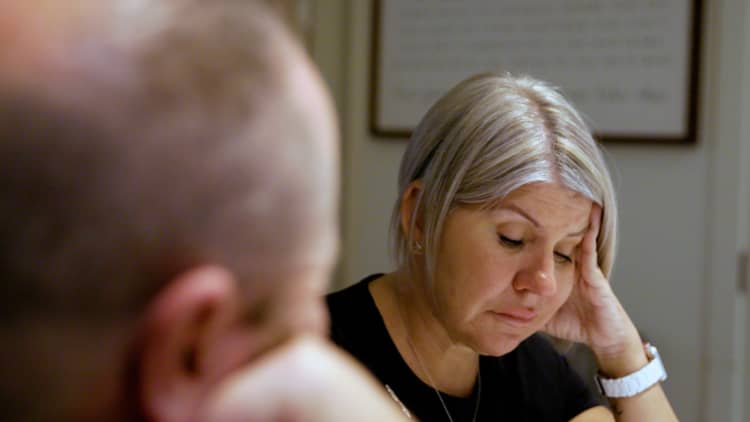Valentinrussanov | E+ | Getty Images
For millions of Americans, a Covid-19 infection has turned into a long, drawn-out health condition with no expiration date.
Those physical symptoms are often accompanied by increased financial uncertainty, according to recent research from the Urban Institute.
Approximately 1 in 5 adults with so-called long Covid symptoms have had problems paying their rent or mortgage, according to the nonprofit research organization. Meanwhile, 1 in 4 had difficulties paying their utility bills, with nearly 10% having had a utility shut off.
More than 4 in 10 adults with long Covid have reported food insecurity, with 1 in 4 reporting very low food security, according to the Urban Institute.
More from Personal Finance:
How to talk about job loss as you hunt for a new role
Less than 5% of housing accessible to older, disabled Americans
Hybrid work is new normal, as companies rethink work habits
Those new findings come on top of previous research that shows long Covid patients typically experience income and employment disruptions.
Covid reduced the number of people in the labor force by 500,000, according to 2022 research from economists Gopi Shah Goda and Evan J. Soltas, published in the National Bureau of Economic Research, prompting average lost earnings of $9,000.
A rough estimate pegs the size of the population affected by long Covid symptoms at between 7.7 million to 23 million people in the country, according to the U.S. Department of Health and Human Services. That is based on the idea that up to 30% of those infected with Covid-19 will experience longer lasting symptoms.
Symptoms associated with long Covid include chest pains, cough, cognitive impairment, memory loss, fatigue, shortness of breath and muscle and joint pain.

The vague set of symptoms can leave patients subjected to doubts from the medical community, Meghan O’Rourke, author of the book “The Invisible Kingdom: Reimaging Chronic Illness,” said during a Tuesday panel hosted by the Urban Institute.
O’Rourke herself suffers from long Covid symptoms.
“When tests don’t show clear answers, we’re suddenly turned into unreliable narrators,” O’Rourke said.
The barriers to proper medical care are exacerbated by a lack of support to enable patients to continue to live their lives, put food on the table and try to work, she said.
“We absolutely have to commit to social support, disability aid, for people living with long Covid” and other chronic illnesses, O’Rourke said.
The Urban Institute’s research, and feedback from experts, points to three changes that may help bolster social supports for long Covid sufferers.
1. Expand safety net and increase benefits
Long Covid patients in need of assistance may turn to a host of programs for help: Social Security disability insurance, or SSDI; Supplemental Security Income, or SSI; Supplemental Nutrition Assistance Program or SNAP; Temporary Assistance for Needy Families, or TANF; Medicaid; and rental and utility assistance programs.
But accessing those benefits is not always easy. Applicants for Social Security disability benefits face long waits, while applicants for housing assistance may also be put on lengthy waiting lists.
“When people can’t afford to meet their basic needs, they have much greater difficulty recovering from illness and are at much greater risk of poor health,” said Michael Karpman, principal research associate at the Urban Institute.
Even if you get on those benefits, it is very difficult to meet your basic needs.
Lisa McCorkell
co-founder of Patient Led Research Collaborative
Steps may be taken to broaden eligibility for these programs, the Urban Institute’s research suggests — by streamlining application processes; expanding eligibility to non-citizens and reducing policies such as asset limits and work requirements; and expanding the professionals who can provide medical documentation.
Additionally, many people may not know they may be eligible for benefits, which may be remedied by more funding for community-based organizations to provide additional outreach and enrollment assistance.
Further, the size of benefits like Supplemental Security Income may be increased so beneficiaries may live better quality lives.
“Even if you get on those benefits, it is very difficult to meet your basic needs with that level of income,” said Lisa McCorkell, co-founder of Patient Led Research Collaborative. “It is really just not enough money in order to survive.”
2. Make paid leave accessible
Halfpoint Images | Moment | Getty Images
The U.S. is one of the few developed countries without paid sick or family and medical leave policies.
Efforts to put a federal plan in place have thus far stalled on Capitol Hill.
Having access to universal paid leave would help ensure people infected with Covid-19 do not spread it and can rest while recovering, Urban Institute’s research found. Moreover, people who develop long Covid may have a longer amount of time before they have to return to work.
Such a policy may help people with lower incomes, who often do not have access to paid sick days, the most, according to the research.
3. Add flexibility to workplaces
Employers offering reasonable accommodations such as flexible schedules, frequent breaks or the ability to work from home may help people with long Covid stay employed, according to the Urban Institute.
More than a year after contracting Covid, about 18% of those with long Covid still hadn’t returned to work, recent study by the New York State Insurance Fund found.
Meanwhile, 40% returned to work within 60 days, the research found. But they still required medical attention, prompting the need for accommodations like reduced hours.
Altogether, the changes may help patients who are suffering from other conditions, in addition to long Covid, the experts noted during Tuesday’s panel.
There should be more medical centers that deal with autoimmune diseases and infection associated chronic illnesses, just as we have cancer centers, O’Rourke suggested.
“Many of the policy changes we need are not unique to long Covid,” McCorkell said. “We need a more robust social safety net in place for all disabled people.”

